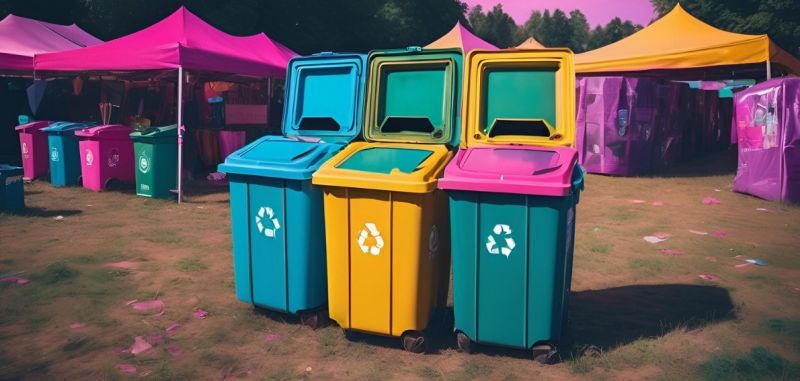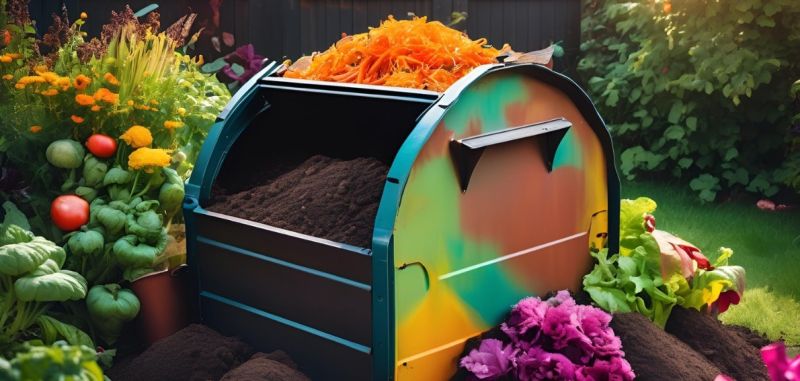As music festivals grow in popularity, the environmental impact they create has become a major concern.
With massive crowds, food vendors, transportation, and large-scale production, the carbon footprint of a typical festival can be significant. However, many event organizers are taking proactive steps to reduce their environmental impact and make their festivals more sustainable.
Selecting venues that prioritize sustainability practices, such as energy efficiency and waste reduction, is crucial for hosting an eco-friendly event. Organizing an environmentally sustainable music festival is not only good for the planet but can also enhance your brand reputation, attract environmentally-conscious attendees, and set a positive example for the industry.
The growing awareness and responsibility among festival organizers and attendees highlight the importance of environmental consciousness in the music and festival industries.
In this article, we’ll walk you through five key tips that will help you plan and execute an environmentally sustainable music festival.
From reducing waste and sourcing eco-friendly materials to promoting sustainability among attendees, these tips will give you practical steps to make your festival greener.
1. Minimize Waste with Effective Waste Management Strategies
Eco-friendly practices are one of the most critical aspects of organizing a sustainable music festival. With thousands of people attending and consuming food, beverages, and merchandise, waste can accumulate quickly. Without a plan in place, you could end up with a festival site littered with plastic bottles, food wrappers, and other non-recyclable waste.
To minimize waste and improve your festival’s environmental impact, focus on the following strategies:
Reduce Single-Use Plastic Waste and Implement a Comprehensive Recycling Program

One of the easiest and most effective ways to reduce waste is by eliminating single-use plastics. Encourage food vendors to use compostable or recyclable packaging instead of plastic containers. For beverage stations, you can offer refillable cups or encourage attendees to bring their reusable water bottles.
To further discourage plastic waste, consider providing a water refill station throughout the venue to give attendees easy access to free water. By offering sustainable alternatives to single-use plastics, you significantly reduce the overall waste produced at your festival.
Ensure your festival includes clearly marked recycling bins throughout the venue, making it easy for attendees to separate waste. The bins should be strategically placed near food courts, stages, and high-traffic areas to encourage people to dispose of their waste responsibly.
Work with local waste management companies to ensure that the items collected are properly sorted and recycled. Additionally, you can educate attendees on the importance of recycling through signage, announcements, and social media campaigns before and during the festival.
Food Waste Reduction and Composting Organic Waste

Food waste is another major issue at large-scale events. While it’s important to provide ample food and drink options, it’s equally essential to manage leftovers effectively. One way to minimize food waste is by partnering with food banks or organizations that can collect excess food after the event. You could also encourage food vendors to offer smaller portion sizes to reduce over-ordering and food waste.
Composting is an environmentally friendly solution for managing food scraps and other organic materials. Set up composting stations where food vendors and attendees can dispose of organic waste. Additionally, ensure that the materials are collected, processed, and used to enrich the soil, either on-site or through partnerships with local farms.
By implementing a thorough waste management plan, you’ll be able to minimize landfill waste and make your festival more sustainable.
2. Embrace Eco-Friendly Energy Sources
Energy consumption at music festivals is often one of the largest contributors to environmental degradation. Utilizing renewable energy sources is crucial for reducing the environmental impact of music festivals.
From powering stages, lighting, and sound systems to running food vendors and sanitation facilities, music festivals require a significant amount of energy. However, it’s possible to reduce your festival’s carbon footprint by embracing renewable and eco-friendly energy sources.
Use Solar Power and Encourage Energy Efficiency

Solar energy is one of the most effective and sustainable energy sources for music festivals. You can use solar panels to power stages, light installations, and even food vendors. Many festivals have already begun adopting solar-powered solutions, and they offer a low-emission alternative to traditional generators that rely on fossil fuels. Solar-powered lighting and sound systems are also relatively easy to implement, making it a viable solution for festivals of all sizes.
If your festival is held in an area with abundant sunlight, consider incorporating large solar arrays to power a significant portion of your festival. You can also encourage vendors to use solar-powered chargers for their devices and equipment, further reducing reliance on traditional energy sources.
Encourage festival attendees and vendors to adopt energy-efficient practices. This can include turning off lights when not in use, reducing unnecessary lighting and electrical consumption, and utilizing energy-efficient equipment. Promoting energy-saving practices throughout your festival site helps to further reduce overall energy consumption.
Utilize Battery Storage Systems

To ensure that the power supply remains consistent throughout the festival, consider using battery storage systems. These systems can store solar energy or other renewable energy sources during the day and release the stored energy when needed, such as at night or during peak festival hours.
Battery storage solutions help reduce the need for diesel generators, which contribute to greenhouse gas emissions.
Switch to LED Lighting
Lighting accounts for a significant portion of the energy consumed during festivals. By switching to LED lights, you’ll reduce energy consumption by up to 80% compared to traditional incandescent bulbs. LED lights also last longer, which reduces the need for frequent replacements, helping to minimize waste. Consider using LED lighting for both functional lighting (e.g., walkways) and decorative purposes (e.g., stage lighting).
3. Promote Sustainable Travel and Transportation
Transportation is another area where music festivals can have a significant environmental impact, particularly with large numbers of attendees traveling long distances to attend the event. Major music festivals promote carpooling and the use of public transport to reduce carbon emissions.
Encouraging sustainable transportation methods is essential for reducing your festival’s overall carbon footprint. Music festivals worldwide have adopted sustainable transportation practices, such as extensive recycling, renewable energy use, and campaigns to minimize waste, demonstrating a growing commitment to reducing their environmental impact.
Provide Shuttle Services and Promote Carpooling

One way to reduce the number of cars driving to your festival is by offering shuttle services from key points in the city or region. By providing shuttle buses or other shared transportation options, you can reduce the number of individual vehicles and lower emissions. Encourage attendees to take advantage of these services by offering discounted or free shuttle passes with their tickets.
Additionally, you can also encourage attendees to carpool to the event by offering designated carpool parking areas or even incentivizing ridesharing with discounts on tickets or concessions. Many apps can help festival-goers connect with others who are traveling from the same area, making carpooling an easy and effective option. Providing clear instructions on how to carpool and where to park carpool vehicles can further incentivize attendees to share rides.
Bicycle-Friendly Options

For attendees living locally or in nearby areas, biking to the festival can be a fun and eco-friendly alternative to driving. Ensure that there are bike racks and secure storage areas for bicycles, so attendees can safely park their bikes while they enjoy the festival. You can even provide incentives like discounts on tickets or merchandise for attendees who choose to bike.
Partner with Public Transportation

Work with local public transportation authorities to offer discounts on buses, trains, or subways for festival-goers. This could include special festival passes or fare discounts for ticket holders, making public transport an attractive and accessible option for attendees.
By promoting public transportation options, you reduce the number of cars traveling to and from the festival, lowering your festival’s carbon footprint.
4. Support Local and Sustainable Vendors
One of the easiest ways to make your music festival more sustainable is by partnering with eco-conscious vendors who prioritize using sustainable materials and eco-friendly products in their services and practices. Supporting local, sustainable vendors helps reduce the carbon footprint associated with transportation and contributes to the local economy.
Source Locally Grown Food

Instead of relying on food vendors that import products from far-flung locations, aim to source locally grown and organic produce for your festival to enhance environmental sustainability. This helps reduce the carbon emissions associated with transportation and supports local farmers. Locally sourced food also often has a lower environmental impact in terms of packaging and processing.
Encourage food vendors to use compostable or biodegradable plates, cups, and utensils, and ensure that waste is sorted into compost, recycling, and landfill categories. Offer a selection of plant-based options that have a lower environmental impact compared to animal-based foods.
Choose Eco-Friendly Merchandise

When selecting merchandise for your festival, prioritize eco-friendly options to align with the principles of sustainable festivals. Choose items like reusable water bottles, sustainable clothing, and other environmentally conscious products.
Avoid promoting items that are made from plastic or materials that contribute to waste. If possible, opt for items that can be reused or recycled. You can also consider implementing a merchandise take-back program, where attendees can return old festival gear for recycling or reusing.
Work with Green Partners

Look for vendors, sponsors, and partners that align with your environmental values. These can include companies offering eco-friendly products, green certifications, or sustainable event solutions. Partnering with companies that focus on sustainability ensures that your event’s green initiatives are backed by businesses with similar goals.
5. Engage Attendees in Sustainable Practices
One of the most important aspects of organizing an environmentally sustainable music festival is engaging your attendees and encouraging them to adopt sustainable practices, aiming for zero waste music festivals. Attendees play a significant role in the festival’s overall environmental impact, so it’s essential to educate and involve them in your green initiatives.
Promote Sustainable Messaging

Use your festival’s website, social media channels, and on-site signage to promote sustainability and encourage attendees to take part. This can include tips on recycling, bringing reusable items, using sustainable transportation, and reducing waste.
Consider launching a “green pledge” campaign, where attendees commit to following sustainable practices during the event, such as avoiding single-use plastics or carpooling to the venue.
Educate Through Workshops and Provide Incentives for Green Behavior

Provide workshops or educational sessions on sustainability, where attendees can learn more about how their choices impact the environment and discover practical ways to reduce their footprint. The Shambhala Music Festival is a prime example of a festival committed to environmental practices, such as recycling programs, renewable energy usage, and organic food offerings, serving as a model for sustainable festivals.
You could also include green activities like tree planting, DIY upcycling, or sustainable fashion shows to inspire attendees to get involved in sustainability beyond the festival.
Offer incentives for attendees who engage in sustainable practices. For example, reward those who use reusable cups or bottles with discounts on merchandise or food. You could also hold a contest for attendees who share their sustainable actions on social media, such as using #GreenFestival or posting about their sustainable travel options.

Organizing an environmentally sustainable music festival requires dedication, creativity, and a commitment to reducing your event’s environmental impact. By minimizing waste, embracing eco-friendly energy sources, promoting sustainable travel, supporting local vendors, and engaging attendees in sustainable practices, you can host a festival that benefits not only the music community but also the planet.
With growing environmental awareness and a shift toward sustainability across industries, festival-goers are increasingly looking for events that align with their values. By adopting these sustainability practices, you not only create a greener festival but also set a positive example for other festivals to follow.
The future of music festivals lies in sustainability—let’s make sure we’re leading the charge in protecting the environment while providing an unforgettable experience for attendees.
You May Also Like:
Navigating the Pain Points: Achieving Profitability and Sustainability for Festival Organizers
Music Event Technology Trends 2025: Innovations Shaping the Future of Live Music Experiences
10 Smart Ways to Cut Music Festival Costs Without Sacrificing Quality



 30th June 2025
30th June 2025